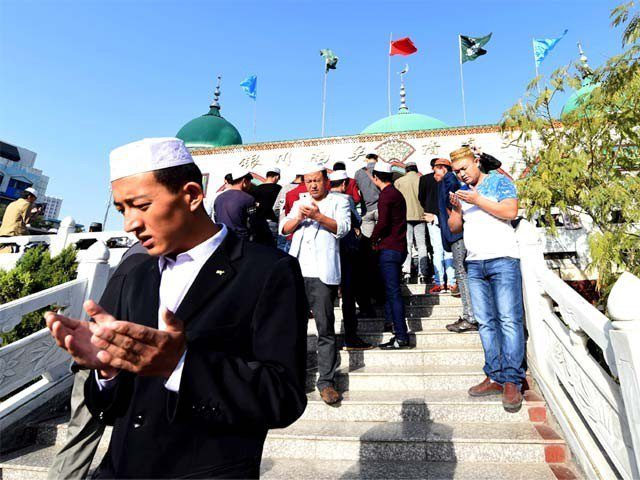The Chinese government has investigated its own religious tolerance and found that Muslims in Western Xinjiang province, where open observance of Ramadan and Muslim garb on public transportation are banned, enjoy “unprecedented religious freedom” thanks to Beijing’s generosity.
In a white paper titled “Freedom of Religious Belief in Xinjiang,” the Chinese government declares that, in the capital of the Muslim Uighur minority, “no citizen suffers discrimination or unfair treatment for believing in, or not believing in, any religion.” State newspaper Xinhua reports that the white paper alleges that the freedom of Uighurs to practice their religion “cannot be matched by that in any other historical period.”
“Normal religious activities in Xinjiang are protected by law, and religious organizations are responsible for coordinating internal religious affairs and the government should not interfere,” Xinhua alleges, citing the white paper. The report cites as evidence of Beijing’s benevolence the hajj program the Chinese communist government pays for. “To ensure successful pilgrimages for believers in Islam, Xinjiang arranges charter flights every year, taking more than 3,000 Muslims to Mecca in Saudi Arabia,” a Chinese official claimed in a press conference.
The Chinese government has for many years arranged flights to Saudi Arabia to help Chinese Muslims complete the hajj, the holiest ceremony in Islam. Traditionally, however, the government has offered these flights to members of the Hui ethnic minority, who live in the center of the country and boast a much friendlier relationship with the Han majority communist leaders in Beijing.
The white paper also claims that the free observance of the holy month of Ramadan is permitted in the province, while warning that “religious extremism” and religion are treated differently. “China prohibits any organization or individual from splitting the country, disseminating extremist religious thoughts, inciting ethnic hatred, undermining national unity, disturbing social order, or impairing citizens’ physical and mental health in the name of religion,” Xinhua notes.
The white paper does not note any of the various regional laws imposed to eradicate Islam from the public sphere. Within the last two years, allegedly as a response to the growing threat of radical Islamic Uighur groups, China has banned wearing the burqa, wearing any Islamic clothing or beards on public transportation, and forced Muslim-owned shops in Xinjiang to stock haram products like alcohol and cigarettes. Anyone in Xinjiang caught “practicing religion,” however police choose to define that, in a public place is immediately arrested, and members of the Communist Party are not allowed to be caught fasting in public during Ramadan.
These regulations were put in place as studies began to reveal that young Chinese nationals were increasingly drawn to religion as an antidote to communism, the state religion. Christianity in the east and Islam in the west have been booming among young Chinese in the past several years. In the east of the country, Beijing has implemented parallel restrictions on Christianity to those on Islam in Xinjiang, including prohibiting churches from exhibiting crosses on their peaks and banning unauthorized Christian churches, particularly the Baptist church.
In addition to masking the wide array of regulation passed to suppress the visibility of Islam in Xinjiang province, the white paper makes a clear and aggressive point of opposing “foreign domination,” without identifying any foreign threat in particular. “China upholds the principle of independence and self-management in religious undertakings and foreign organizations and individuals must not interfere,” the paper reads.
This assertion can be read as a response to the growing attempts by the Islamic State to woo disenchanted Muslim Uighurs to its cause, or even ethnic Han Chinese. In December, the Islamic State released a Mandarin-language nasheed, or fight song, encouraging Chinese nationals to leave their countries and join the jihad in Syria and Iraq. Uighurs speak their own Uighur language, implying that the Mandarin release was targeting Mandarin speakers: Han Chinese. While enticing young Chinese men to join the Islamic State, the group has also threatened terrorist attacks against the “atheist Chinese” within their borders in their English-language magazine, Dabiq.

COMMENTS
Please let us know if you're having issues with commenting.